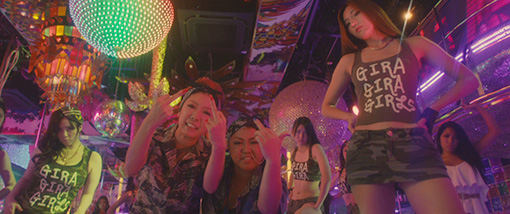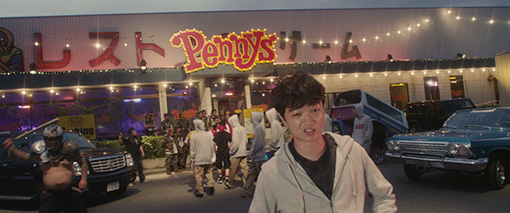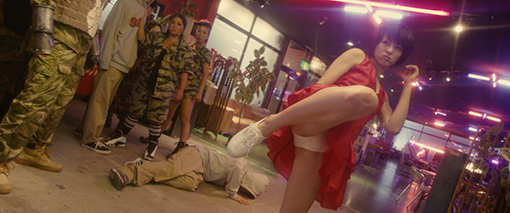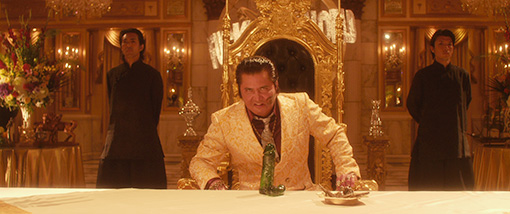|
Japanese director Sion Sono (actually Sono Shion, but let's go with the moniker on the opening titles) has had an eclectic film career, from his gloriously playful, four-hour Love Exposure to the punishing graphic horror of Cold Fish and the warm humanism of Land of Hope. Given his track record, I had no idea what he'd throw at us next, but had you given me a thousand guesses I'd never have come up with Tokyo Tribe, a brightly coloured gangland battle rap musical. What's it about? Ah...
In an alternate reality Tokyo, the streets are controlled by rap gangs known as tribes, each of whom runs a specific territory. Their rivalry is stoked by the all-powerful Bukuro Wu-Ronz tribe, whose boss Lord Buppa has struck a deal with a new gang, the Waru, to wipe the other tribes out and take over the city. His blond-haired son Nkoi has a particular hatred for peace and friendship loving Musashino Saru tribe, and lures their leader Kia to his domain with the intention of killing him, but ends up murdering his friend Tera instead, a popular figure with all of the other gangs. Buppa, meanwhile, is tasked with the job of locating Sunmi, the daughter of his High Priest overlord, who has fled to Tokyo under a false name and inadvertently ended up on Kia's team. To this end he engages two potentially deadly operatives, the hugely muscular Jadakins and the spin-kicking Kamekichi, whose no-nonsense approach to investigation further inflames the conflict.

And apart from the fine detail and the finale, that's about it. It's been some time since I watched a film with as little plot as you'll find here, and it's not that it dawns on you after the film has finished – three or four times I caught myself pondering on the almost complete absence of narrative in the film's second half. Does it matter? Well...
Hip-hop produced some of the most vibrant street music of the post-punk years, but the technique of rapping also evolved into a curse of nightmarish proportions, as every talentless git on the planet tried to string badly composed lines together and bang them out in what they thought was a gangsta accent. This reached its nadir when fathers started attempting to rap in a misguided effort to sound cool to their painfully embarrassed children. As a musical form it has its roots in black American street culture, but its easy access, do-it-yourself nature (no instruments to learn here) has seen it travel around the world, with just about every culture producing its share of rap artists, most of whom do their damnedest to sound like the American performers whose work they were first inspired by. They rarely do.
This is certainly the case with Tokyo Tribe, where the rapped-out lyrics are a mishmash of Japanese and English and are busy with words you'll not find elsewhere in Japanese culture. 'Motherfucker' proves to be a particular favourite (there's even a tribe named the Nerimuthafuckaz), and the macho posturing for which American hip-hop has been repeatedly criticised is certainly evident here. Not all of the dialogue is rapped it should be noted, which intermittently gives the performers the chance to vocally express a little emotion, something the conventions of this musical form otherwise tend to neuter.

From a musical viewpoint, the main issue is that the rapping is nothing special, lacking the anger, urgency and lyrical smarts of the likes of Public Enemy, NWA, Wu-Tang Clan, Tupac Shakur and the like (feel free to pick your own list of more up-to-date favourites), despite a cast peppered with real-life Japanese DJs and hip-hop artists. The thumping backbeats also have a sometimes generic feel, but do give the film a heartbeat that you soon start to miss when it's put on pause, and intermittently it clicks with the visuals to produce something a little more vibrant.
Yet in spite of its lack of plot, its often middling rap work and the monotony of certain aspects, Tokyo Tribe is strangely addictive and disarmingly easy to like. It's certainly a somewhat contradictory film, one unlike anything you're likely to have seen recently but bristling with recognisable influences. Imagine, if you will, a head-on collision between Absolute Beginners, Streets of Fire, The Warriors, a 70s-era kung-fu movie, a rap music video, a manga comic (that it was based on a manga comes as no surprise), a Tex Avery cartoon, the production design on the original Total Recall and the almost ethereally drifting camera in Gaspar Noé's Enter the Void and you might just have a flavour of what you'll encounter. And this is just a sampling. There's even a living sculpture room (the implications of which are really rather horrible) that appears to be modelled on the Korova Milk Bar from A Clockwork Orange.
It all proves unexpectedly seductive, with Sono's decision to shoot in long takes that flow with the action and intermittently drift up to take in the surroundings, binding the visuals to the music every bit as effectively as that sequence in La Haine when the camera seemed be carried by the wound waves of the beats being thumped out by a housing project stereo. Whoops, that's another possible influence. These long takes also allow us to properly appreciate the fight choreography and execution, with performers required to pull of several moves in a row without assistance from the editor to artificially bump up their skills.

While no-one is likely to score any acting awards here, most manage well enough within the film's live action manga framework. Sometani Shôta in particular makes for a nicely low-key and likeable MC, the film's Greek chorus whose observations are rapped in largely unexcited monotone but who really comes into his own in the final big brawl, simultaneously delivering his chant to camera as he ducks blows and punches out anyone who crosses his path without missing a beat. The fighters are all impressive, with Nana Seino excelling as the cute ball of flying fist and feet that is Sunmi, though no opportunity is missed to whip up her skirt and present her underwear for the camera. For sheer spectacle, however, the crown has to go to the single monikered Joey as Kamekichi, whose twirling acrobatics are so astonishing that I'd have sworn he was wire assisted and the camera under-cranked had the extra features not proved this not to be the case. Suzuki Ryôhei's loudly cocksure and self-satisfied portrayal of Mera is par for the Eastern action cinema course, but it's hard to know what was going through Sono's mind when he gave Takeuchi Riki free reign to ham it up as Buppa, which he does to a degree that would have had even Tod Slaughter holding his head in his hands in disbelief.
It's hard to get too emotionally involved with characters who are essentially performing a revue for the camera, but the desire to see the gangs put their differences aside and unite against Buppa (if only to shut the ridiculous bastard up) eventually had me rooting for the good guys and quietly cheering when they dished out the appropriate beatings. By the end I was a little dizzy, unsure what I'd spent the past couple of hours watching but still wearing a widest of smiles. Visually sumptuous and never dull for a second, in terms of its content and characters, Tokyo Tribe is probably Sono's least substantial film to date, but in it's own defiantly daffy way, it's also the most fun.
The original plan was to shoot Tokyo Tribe on a combination of 35mm and 16mm film, but Sono and his cinematographer Sôma Daisuke ultimately opted to shoot digitally on a 2K RED camera. That the 2.40:1 HD transfer here has a slightly digital feel is thus unsurprising and frankly does the film no harm, accentuating the lush and deliberately colourful tackiness of the production design, lighting and tribal costumes. As you would expect, the image is spotless, the detail crisp and the colours appropriately loud – what does surprise a little is the inconsistency of the contrast and black levels, which can be punchy in one scene and softer in the next. I'm going to go out on a limb here and suggest that this was intentional, particularly given the almost infinite games with the image that can be played in post-production now and the consistently high standard of the transfers on Eureka discs (take a look as the astonishing transfer on their Blu-ray of Alain Resnais' Life of Riley if you want your jaw to drop).

I don't remember the last time my subwoofer was given as big a workout as it gets from the DTS-HD Master Audio 5.1 soundtrack here – the bass beats deliver a serious nightclub thump, and there are a lot of bass notes here. Clarity and dynamic range are both excellent, although the mix sometimes favours the music over the un-rapped dialogue, which while still audible could sometimes do with a bit of a push.
The optional English subtitles do a sometimes sterling job of making English rhymes from Japanese language raps without betraying the original meaning, and if they can't make it work they'll go with accuracy over poetry.
Deleted Scenes (3:27)
4 brief deleted scenes, edited and scored but not graded and lacking Foley effects, which means the blows are delivered silently.
Making Of (64:29)
A trip through all 20 days of the shoot, complete with set-ups, run-throughs, the recording of takes, off-the-cuff interviews and some gooning around. Not all of the shooting days are given equal coverage, with a couple only featuring a brief look at the filming of a single sequence. It's here that I learned just how many Japanese hip-hop artists have roles in the film and was presented with evidence that Joey's acrobatics were all done for real, while the peek behind the scenes of what was clearly a fun shoot for everyone proves most engaging. In that very Japanese way, almost everyone appears humble about their work on the production, although the colourfully named Cyborg Kaori, who plays Buppa's human beatbox servant girl, comes across here as borderline bonkers. A useful and entertaining extra.
Trailer (1:44)
A seductively cut sell whose minor spoilers pass too quickly to register.
The release disc also comes with a limited edition collector's booklet featuring new writing on the film by critic Aaron Hillis along with behind-the-scenes photography, but this was not supplied for review.
Gossamer thin on plot and playing at times like a live-action cartoon, Tokyo Tribe is a million miles from whatever you might think could define a typical Sono Sion film, which only goes to show just how diverse his portfolio has become. In spite of my gripes, I had great fun watching it, and Eureka's Blu-ray boasts a solid transfer, a mother of a soundtrack and a substantial Making-of documentary. Uncertainties aside, it gets a thumbs-up.
|